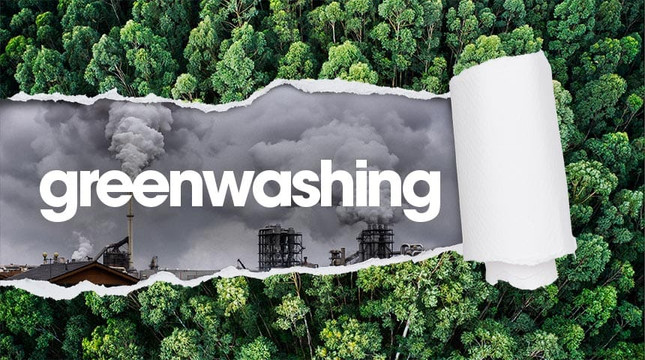Can Greenwashing be Regulated? Here’s How

August 20, 2024 – Greenwashing is a term that refers to something pretty basic: when a company lies or misleads their customers about the environmental impacts of their product or company. In a world full of polluting plants and gas-guzzling trucks, marketing tactics might not seem that important, but they are. This happens all over the United States, including by firms that operate in Pennsylvania, such as Shell.
Unfortunately, greenwashing works. Imagine there are two firms, both are equally damaging to the environment. If one firm “greenwashes” by running marketing campaigns that sell themselves and their products as “green” and “all-natural,” and the other stays quiet about their environmental impact, consumers will give the greenwashing firm a more positive score on perceived environmental performance.
This not only influences how people spend their money, which is important, but it also can affect the public’s attitude towards governmental regulation or legislation about environmental policy. If we allow industries to greenwash, there will be less public pressure on politicians to create mandatory climate disclosures or other environmentally beneficial rules. Therefore, it is important to regulate this type of misleading and false speech. Unsavory corporations, though, argue that regulating (disallowing) greenwashing speech violates their First Amendment right to free speech.
The Council spoke with Amanda Shanor, a First Amendment scholar and an assistant professor at The Wharton School of the University of Pennsylvania, who recently published an essay in the Columbia Law Review on this very topic. Professor Shanor makes a compelling argument that regulation of false and misleading greenwashing speech does not violate the First Amendment of the Constitution.
Although “free speech” is often thrown around in casual conversation, the actual thrust of the First Amendment is a nuanced and convoluted area of law. “Free speech” isn’t a “get out of jail free” card most of the time. For example, if a doctor gives you incorrect medical advice which leads to an injury, they can’t claim “free speech” to escape liability for medical malpractice. Likewise, in the commercial context, firms can’t openly lie about what their products do, then use “free speech” to shield themselves. It is commonly understood that the Federal Trade Commission is allowed to regulate false advertising – companies can’t lie about the nutritional value of their food, or the health impacts of their products, for instance.
In this greenwashing context, we must ask a few questions to determine whether greenwashing claims by corporations are protected by free speech. It’s helpful to think about this as a flowchart:
First, is the speech commercial or political? Political speech cannot be restricted or regulated under the First Amendment, but commercial speech can. Just because climate change may be a “politically charged” issue does not make a firm’s factual statements on their environmental impacts “political” in nature.
Second, is the commercial speech a fact or an opinion? This can be a blurry line, but reports about specific information, such as whether a product is recyclable or the amount of emissions a plant emits, are facts. Opinions, on the other hand, are much more difficult to regulate.
Third, is the “fact” actually true or is it false, misleading, or fraudulent? This is somewhat of a tricky line, especially in the climate context where the science deals with possibilities and risks, rather than certainty. However, Professor Shanor makes the argument that consensus within the scientific community should be the standard for truth in this context.
In this paradigm, plainly false and misleading statements by a corporation about their product or their firm can be regulated under the First Amendment. Furthermore, Professor Shanor articulates why this makes sense given the normative reasons for the First Amendment.
The First Amendment’s underlying purpose is to allow the free flow of information to citizens so that people can make informed decisions at the ballot box, creating a truly free democracy. Professor Shanor argues that this freedom extends to economic activity as well, in a term she labels “economic democracy.” The main idea is that the ability to freely and meaningfully participate in economic life is made possible by free-flowing and true information. Because we live in a market economy, the economic choices people make affect their enjoyment of life, and also influence how they feel about the current government, consequently affecting their voting choices. Regulating greenwashing is just one of myriad ways to ensure that everyday citizens have the requisite information to freely participate in economic democracy.
The ability to effectively regulate greenwashing is a major tool in the fight against the climate crisis. And the First Amendment is no barrier to this type of regulation. Both the Federal Trade Commission and the Securities & Exchange Commission should have the power to stop companies from blatantly lying about their environmental impacts. The FTC should continue to bolster its “Green Guides” that specify how false advertising claims apply to environmental claims. The SEC is on the right track with its recent climate disclosure rule, which requires firms to disclose climate-related risks of their business, and more regulations like this should be considered.
But these regulatory agencies do not work alone – it is up to us, the people, to put pressure on the government to strengthen these regulations. This can look like many different ways. It could be writing to our elected officials to explain that We the People want strong environmental policy. It could look like organizing in our own communities. It can be as simple as refusing to blindly believe polluting companies when they try to greenwash us. Together, we can disallow greenwashing from influencing our democracy.

